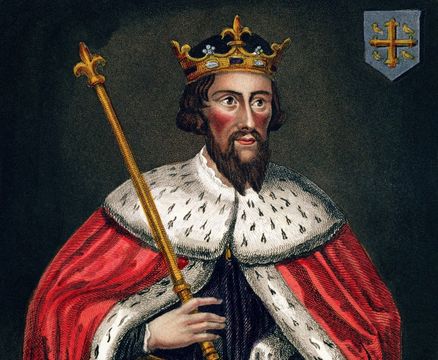
Alfred the Great (849-99), after a painting in the Bodleian Gallery.
Many monarchs in the long history of Great Britain have been mediocre and worse. Some few have been quite good indeed. However, only Alfred, the 9th-century king of the West Saxons, has been honored by history with the sobriquet “Great.”
Unlike heroes such as Winston Churchill and Edith Cavell, Alfred the Great had no single defining moment but emerges from the pre-Norman mist as a wise, judicial royal leader called by some among the best kings ever to rule mankind. Churchill himself wrote that Alfred was “the greatest Englishman who ever lived.”
Alfred was born in Wantage, Berkshire, in 849, the fifth son of the Wessex king, Aethelwulf. When 4 years old, he accompanied his father to Rome, where legend has it the boy was anointed king by Pope Leo IV. After the death of Aethelwulf and short successive reigns of his elder brothers, in 871 Alfred inherited the throne of a kingdom which stretched from Devon to Sussex and northward to Oxfordshire.
Read more
This was the violent time of the Viking invasions of England. No king could long survive the era without military success. After defeating the Danes at the Battle of Ashdown in 871, Alfred fought a succession of campaigns that culminated in an 886 treaty dividing England. To the east, between the Rivers Thames and Tees, lay Danish territory known as the Danelaw. The remaining Anglo-Saxon kingdoms unified under King Alfred.
If Alfred the Great’s reign had been characterized simply by his prowess as a military leader, however, he would today be just another little-recalled Dark Age chieftain. Uniting the petty kingdoms of 9th-century England, formulating an effective strategy of defensive communities or burghs and winning a 15-year period of peace for his people were tremendous accomplishments of diplomacy. More than any other single individual, Alfred created the country we know as England.
As an administrator, Alfred championed social order and justice. He studied law-giving and authored a legal code, curtailing the ancient practice of the blood feud and establishing trial by jury. With the country scarred by years of fighting against Viking war parties, Alfred spent his energies in peacetime founding and rebuilding monasteries, churches, and centers of learning.
Alfred the Great’s own contributions to scholarship included Anglo-Saxon (Old English) translations from the Latin of Boethius, Orosius, St. Gregory the Great and the Venerable Bede’s Ecclesiastical History. He directed England’s first secular history, the Anglo-Saxon Chronicle, and actively supported the development of education and the arts.
“Desire for and possession of earthly power never pleased me overmuch,” wrote Alfred, “and I did not unduly desire this earthly rule, but that nevertheless, I wished for tools and resources for the task that I was commanded to accomplish, which was that I should virtuously and worthily guide and direct the authority which was entrusted to me.”
“An English expatriate and an avid reader of your excellent publication,” Michael Sanders of Desert Hot Springs, Calif., earns thanks for reminding us all of the great Alfred.
Read more
* Originally published in 2007.





Comments